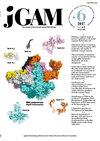24R005A 和 24R005B:从鱼粉培养基中培养的链霉菌中获得的新型 DPPH 自由基清除剂。
IF 0.8
4区 生物学
Q4 BIOTECHNOLOGY & APPLIED MICROBIOLOGY
Journal of General and Applied Microbiology
Pub Date : 2025-02-13
Epub Date: 2024-07-31
DOI:10.2323/jgam.2024.07.002
引用次数: 0
摘要
我们以鱼(鯷鱼)粉为培养基,成功地从链霉菌 24R005 中分离出两种新型化合物 24R005A(1,C13H14O4)和 24R005B(2,C13H13ClO4)。在这项研究中,我们评估了使用鱼(凤尾鱼)粉作为发酵材料生产生物活性化合物的情况。光谱分析显示,这两种化合物具有共同的骨架结构。不过,每种化合物都含有独特的支链侧链。此外,化合物 1 和 2 对 1,1-二苯基-2-苦基肼(DPPH)具有中等程度的自由基清除活性,ED50 值分别为 200 和 130 μM。本文章由计算机程序翻译,如有差异,请以英文原文为准。
24R005A and 24R005B: Novel radical scavengers of DPPH obtained from Streptomyces sp. cultured in a fish powder medium.
We have successfully isolated two novel compounds, 24R005A (1, C13H14O4) and 24R005B (2, C13H13ClO4), from Streptomyces sp. 24R005, using fish (anchovy) powder as a medium. In this study, we evaluated the use of fish (anchovy) powder as a fermentation material for producing bioactive compounds. Spectroscopic analyses revealed that the two compounds share a common skeletal structure. However, each compound contains unique branched side chains. Furthermore, compounds 1 and 2 exhibit moderate radical-scavenging activity for 1,1-diphenyl-2-picrylhydrazyl (DPPH), with ED50 values of 200 and 130 μM, respectively.
求助全文
通过发布文献求助,成功后即可免费获取论文全文。
去求助
来源期刊

Journal of General and Applied Microbiology
生物-生物工程与应用微生物
CiteScore
2.40
自引率
0.00%
发文量
42
审稿时长
6-12 weeks
期刊介绍:
JGAM is going to publish scientific reports containing novel and significant microbiological findings, which are mainly devoted to the following categories: Antibiotics and Secondary Metabolites; Biotechnology and Metabolic Engineering; Developmental Microbiology; Environmental Microbiology and Bioremediation; Enzymology; Eukaryotic Microbiology; Evolution and Phylogenetics; Genome Integrity and Plasticity; Microalgae and Photosynthesis; Microbiology for Food; Molecular Genetics; Physiology and Cell Surface; Synthetic and Systems Microbiology.
 求助内容:
求助内容: 应助结果提醒方式:
应助结果提醒方式:


